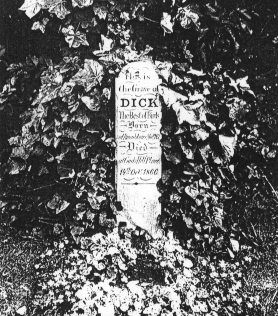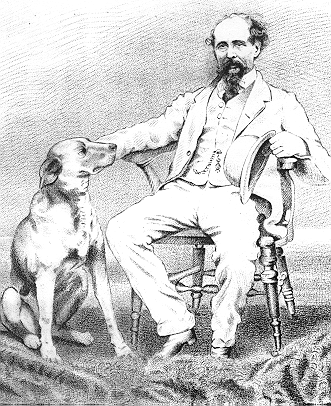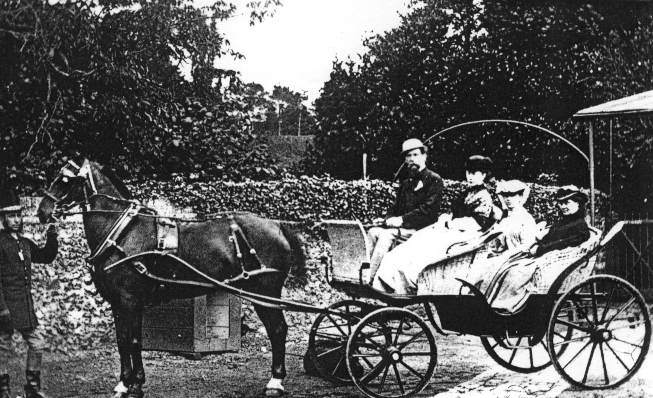Dickens´s Pets
Grip 1. The Raven
Grip 2. both Grips lived at Devonshire Terrace
Sultan a St.Bernard-bloodhound
Timber a white spaniel
Turk a mastiff
Linda a St.Bernard
Don a Newfoundland
Bumble a Newfoundland (Don´s son)
Mrs.Bouncer a white Pomeranian 1859-74
Williamina a cat
Dick a canary
Newman Noggs a pony
There´s a lovely book from J. N. Townsend Publishing
Exeter, New Hampshire called:
THE MASTER'S CAT: The Story of
Charles Dickens as told by His Cat. The story is based on the tale of
the deaf kitten who extinguished the Master's candle one night.



 Williamina Dick Turk Newman Noggs
Williamina Dick Turk Newman Noggs
”He loved animals, flowers and birds, his fondness for the latter being
shown nowhere more strongly than his devotion than in his devotion to
his ravens at Devonshire Terrace. He writes characteristically of the
death of ”Grip”, the first raven: ”You will be greatly shocked and grieved
to hear that the raven is no more..
He expired to-day at a few minutes after twelve o´clock, at noon.
He had been ailing for a few days, but we anticipated no serious result,
conjecturing that a portion of the white paint he swallowed last summer
might be lingering about his vitals. Yesterday afternoon he was taken
so much worse that I sent an express for the medical gentleman, who
promptly attended and administered a powerful dose of castrol oil.
Under the influence of this medicine he recovered so far as to be able,
at eight o´clock, p.m., to bite Topping (the coachman). His night was
peaceful. This morning, at daybreak, he appeared better, and partook
plentifully of some warm gruel, the flavor of which he appeared to relish.
Toward eleven o´clock he was so much worse that it was found necessary
to muffle the stable knocker. At half-past, or thereabouts, he was heard
talking to himself about the horse and Topping´s family, and to add some
incoherent expressions which are supposed to have been either a foreboding
of his approaching dissolution or some wishes relative to the disposal of his
little property, consisting chiefly of half-pence which he has buried in different
parts of the garden. On the clock striking twelve he appeared slightly agitated,
but he soon recovered, walked twice or thrice along the coach house, stopped
to bark, staggered, and exclaimed ” Halloa, old girl!” (his favorite expression)
and died. He behaved throughout with decent fortitude, equanimity and
self-possession. I deeply regret that, being ignorance of his last instructions.
Something remarkable about his eyes occasioned Topping to run for the doctor
at twelve. When they returned together, our friend was gone. It was the medical
gentleman who informed me of his decease. He did it with caution and delicacy,
preparing me by the remark that ”a jolly queer start had taken place.” I am not
wholly free from suspicions of poison. A malicious butcher had been heard to
say that he would ”do” for him. His plea was that he would not be molested in
taking orders down the mews by any bird that wore a tail. Were they ravens who
took manna to somebody in the wilderness? At times I hope they were, and at
others I fear they were not, or they would certainly have stolen it by the way.
Kate is well as can be expected. The children seem rather glad of it. He bit their
ankles, but that was in play.”
As my father was writing ”Barnaby Rudge” at this time, and wished to continue
his study of raven nature, another and larger ”Grip” took the place of ”our friend”,
but it was he whose talking tricks and comical ways gave my father the idea of
making a raven one of the characters in this book. My father´s fondness for
”Grip” was, however, never transferred to any other raven, and none of us ever
forgave the butcher, whom we all held in some way responsible for his untimely
taking off.
”But I think his strongest love, among animals, was for dogs. I find a delightful
anecdote told by him of a dog belonging to a lady whom he knew well, ”Of”, an
immense, black, good-humored, Newfoundland dog. He came from Oxford and
had lived all his life in a brewery. Instructions were given with him that if he were
let out every morning alone he would immediately find out the river, regularly taken
a swim and come gravely home again. This he did with the greatest punctuality, but
after a little while was observed to smell of beer. His owner was so sure that he
smelled of beer that she resolved to watch him. He was seen to come back from
his swim round the usual corner and to go up a fight of steps into a beer shop.
Being instantly followed, the beer shopkeeper is seen to take down a pot (pewter pot)
and is heard to say: ”Well, old chap, come up for your beer as usual, have you?”
Upon which he draws a pint and puts it down and the dog drinks it.
Being required to explain how this comes to pass the man says: ”Yes, ma´am.
I know he´s your dog, but I didn´t when he first came. He looked in, ma´am, as
a brickmaker might, and
he wagged his tail at the pots, and he giv a sniff round and conveyed to me as was
used to beer. So I draw´d him a drop, and he drunk it up. Next morning he came
again by the clock and I draw´d him a pint, and ever since he has took his pint reg´lar.”
On account of our birds, cats were not allowed in the house; but from a friend in London
I received a present of a white kitten -Williamina- and se and her numerous offspring
had a happy home at ”Gad´s Hill.” She became a favorite with all the household, and
showed particular devotion to my father. I remember on one occasion when she had
presented us with a family kittens, she selected a corner of father´s study for their
home. She brought them one by one from the kitchen and deposited them in her
chosen corner. My father called to me to remove them, saying that he could not
allow the kittens to remain in his room. I did so, but Williamina brought them back
again, one by one. Again they were removed. The third time, insted of putting them
in the corner, she placed them all, and herself beside them, at my fathers feet, and
gave him such an imploring glance that he could resist no longer,
and they were allowed to remain. As the kittens grow older they bacame more and more
frolicsome, swarming up the curtains, playing about on the writing table and scampering
behind the bookshelves.
But they were never complained of and lived happily in the study until the time came
for finding them other homes. One of these kittens was kept, who, as he was quite
deaf, was left unnamed, and became known by servants as ”the master´s cat,”
because of his devotion to my father. He was always with him, and used to follow him
about the garden like a dog, and sit with him while he wrote. One evening we were all,
except father, going to a ball, and when we started, left ”the master”
and his cat in the drawing-room together. ”The master” was reading at a
small table, on which a lighted candle was placed.
Suddenly the candle went out. My father, who was much interested
in his book, relighted the candle, stroked the cat, who was looking at him pathetically
he noticed, and continued his reading. A few minutes later, as the light became dim,
he looked up just in time to see puss deliberately put pout the candle with his paw, and
then look appealingly towards him. This second and unmistakable hint was not
disregarded, and puss was given the petting he craved. Father was full of this
anecdote when all met at breakfast the next morning.
Among our dogs were ”Turk” and ”Linda”, the former a beautiful mastiff and the latter
a soft-eyed, gentle, good tempered St. Bernard. ”Mrs. Bouncer,” a Pomeranian, came
next, a tiny ball of white fluffy fur, who came as a special gift to me, and speedily won
her way by her grace and daintiness into the affections of every member of the household.
My father became her special slave, and han a peculiar voice for her -as he had for us,
when we were children - to which she would respond at once by running to him from
any part of the house when she heard his call. He delighted to see her with the large
dogs, with whom she gave herself great airs, ”because,” as he said, ”she looks
preposterously small.” A few years later came ”Don,” a Newfoundland, and then
”Bumble,” his son, named after ”Oliver Twist´s” beadle, because of ”a peculiarly
pompous and overbearing manner he had of appearing to mount guard over the
yard when he was an absolute infant.” Lastly came ”Sultan,” an Irish bloodhound,
who had a bitter experience with his life at ”Gad´s Hill.” One evening, having broken
his chain, he fell upon a little girl who was passing and bit her so severely
that my father considered it necessary to have him shot, although this
decision cost him a great deal of sorrow.
For a short time I had the care of a mongrel called ”Gipsy.” She was not allowed to
enter any of the family rooms, and used to spend her time lying contentedly on the
rug outside the drawing-room. One afternoon a friend came from Chatham bringing
with him a wonderful poodle who had been specially invited to perform all his tricks
for my father´s enjoyment. On his arrival, ”Mrs.Bouncer” became furious, and when
he began his tricks she wet deliberately into the hall and escorted ”Gipsy” into the
drawing-room, as much as to say: ”I can´t stand this. If strange dogs are to be made
much of, surely the dogs in the house may be at least permitted to enter the room.”
She would not look at ”Fosco,” the poodle, but sat throuhgout his performance with
her back toward him, the picture of offended dignity. Just as soon, however, as he
was fairly out of the house, and not until then, she escorted ”Gipsy” back to her rug.
My father was intensely amused by this behavior of ”Bouncer´s” and delighted in telling
this story about her. ”Mrs. Bouncer” was honored by many messages from her master
during his absences from home. Here is one written as I was convalescing
from a serious illness: ”In my mind´s eye I behold ”Mrs.Bouncer,” still with
some traces of anxiety on her faithful countenance, balacing herself a little
unequally on her forelegs, pricking upher ears with her head on one side, and
slightly opening her intellectual nostrils.
I send my loving and respectful duty to her.” Again: ”Think of my dreaming of ”Mrs.Bouncer”
each night!!!”
Of horses and ponies we possessed but few during our childhood, and these were
not of very choice breed. I remember, however, one pretty pony which was our delight,
and dear old ”Toby,” the good sturdy horse which for many years we used at ”Gad´s Hill.”
My father, however, was very fond of horses, and I recall hearing him comment on the
strange fact that an animal ”so noble in its qualities should be the cause of so much
villainy.”
Back
Williamina Dick Turk Newman Noggs